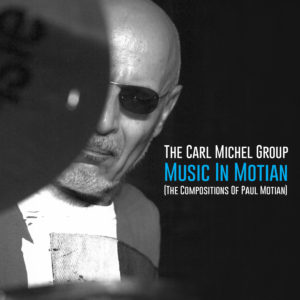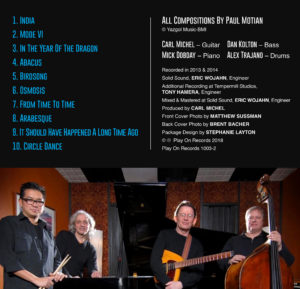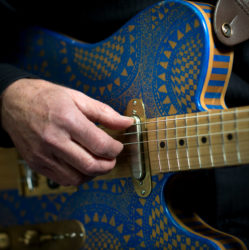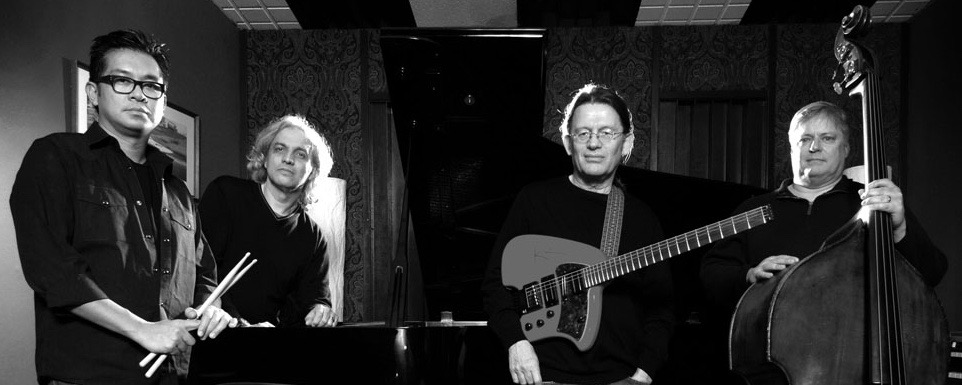Promo for “Music In Motian (The Compositions Of Paul Motian)
Recorded at Solid Sound Video editing by Mark Wade Stone/Storyworks.tv
Available At:
“Music In Motian, by Emmy winning guitarist Carl Michel and his quartet of bassist Dan Kolton, drummer Alex Trajano and piano-man Mick Dobday is an astute and finely curated, crisply performed collection of the drummer’s canon” Mike Jurkovic-All About Jazz
“A delightful voyage of the acolyte, Michel and his bunch find the music that was there all along, in Motian’s original works, and gives it the airing he feels it so richly deserves. Really a date loaded with heart and soul.” Midwest Records


The music of drummer/composer Paul Motian is revered in certain circles of jazz, while resting in obscurity among others. The performing credits of Motian run deep and are extensive, but as a author of highly original music, he lies in the under-documented category. This will not last much longer as, in the years since his passing, his followers are carrying the torch, one such notable being guitarist Carl Michel.
Michel (pronounced Michael) has recognized the contributions of Paul Motian, and he has re-created a complete repertoire of his music. Ann Arbor-based jazz guitarist and composer Michel now has recorded a compendium of Motian’s music played with expert musicians from Southeastern Michigan, a one-of-a-kind tribute to Paul Motian’s music, with adaptations and extrapolations akin to the fertile musical mind Michael is inspired by.
The late drummer Paul Motian was an icon not only among his fellow percussionists but as a composer in his own right. In addition to performing with his own group, he performed with the great pianist Bill Evans’ trio and the legendary Keith Jarrett-led mid-70s small ensemble, while working sidebar gigs with Charlie Haden and Bill Frisell and recording for the Nonesuch, ECM and Winter & Winter labels, among others. Motian became important in many additional ways as a mentor and unique presence in modern jazz.
In his research on and recording of Motian’s music, Michel discovered a blog of Cindy McGuirl, Paul Motian’s niece, who has self-publishing a book, “The Compositions of Paul Motian Volume 1 1973-1989.” Volume 2 of Motian’s compositions will be out early 2018. Her blog, titled “Uncle Paul’s Jazz Closet,” has podcasts of radio shows that she curates featuring her uncle’s music.
As far as Michels’ connection to Paul Motian’s music, it goes back to his early interest in jazz. “I got information from record stores – the first record I had was a Wes Montgomery/Milt Jackson album, then Ralph Towner and Gary Burton. I liked the ECM label and the sound. I fell into John Abercrombie and Pat Metheny pretty hard, but I found a promo copy of Dance by Paul Motian on ECM, and at first I didn’t get it, but I loved the spacious sound, and there was no other drummer so unique. I got acquainted with Keith Jarrett’s American Quartet and Quintet. But it was Paul Motian’s Live In Tokyo that really turned the light on, and I realized so much in his music – elements of Thelonious Monk, Eastern European music and Ornette Coleman coming together in his writing – and it hit a peak.”
“I tried to get in touch with him, wrote to the record label – his music is not in The Real Book – and he graciously sent me 10-12 copies of his music. There’s a lot of depth, and you see how the writing is becoming stronger. By then, he was not touring, only playing in New York, and I went to the Village Vanguard to hear him, Bill Frisell and Joe Lovano. It was religious and mesmerizing. After he passed away in 2011, I was able to meet others through the internet who were interested in his music and had copies and was able to exchange music with them. I wrote his music administrator to see if I could get more, was able to, and did the recording project of which I’m proud.”
Now, as a definitive statement, the music of Paul Motian is available to the world through the keen lens of Carl Michel for all the world to hear, listen to, and deeply enjoy.
1 India 6:42
2 Mode VI 5:57
3 In The Year Of The Dragon 5:37
4 Abacus 5:23
5 Birdsong 1:14
6 Osmosis 3:55
7 From Time To Time 3:50
8 Arabesque 4:08
9 It Should Have Happened A Long Time Ago 4:52
10 Circle Dance 3:49
All Compositions By Paul Motian © Yazgol Music-BMI
Carl Michel – Guitar
Mick Dobday – Piano
Dan Kolton – Bass
Alex Trajano – Drums
Recorded in 2013 & 2014
Solid Sound, Eric Wojahn, Engineer
Additional Recording at Tempermill Studios, Tony Hamera, Engineer
Mixed & Mastered at Solid Sound, Eric Wojahn, Engineer
Produced By Carl Michel
Front Cover Photo by Matthew Sussman
Back Cover Photo by Brent Bacher
Package Design by Stephaine Layton
©℗Play On Records 2018
Play On Records 1003-2
Recordings By Paul Motian That Have Led Me To This Project:
“Motian In Tokyo”
“Motian In Tokyo,” by the Paul Motian Trio, released in 1991 on the JMT label. The trio, featuring Joe Lovano on sax and Bill Frisell on guitar, released eight recordings, three of them were live, this was the first live recording. The CD starts out with “From Time To Time,” one of my favorite Motian tunes. I did a solo version of this for the new CD. It’s a tricky tune to navigate with shifting time signatures. The trio version has some great solo work by Lovano and Frisell. ”Mode VI” is another tune that is on our CD. We play it as a piano/guitar duo, with Mick Dobday on keys. To me it has the construction of a chamber piece. (Joel Harrison has a great version of this on his “Joel Harrison String Choir-The Music Of Paul Motian.”) Also on our new CD is a guitar solo version of “Birdsong,” there are two versions of this on “Motian In Tokyo”. Other songs on “Motian in Tokyo include, “Kathleen Gray,” a ballad by Ornete Coleman/Pat Metheny. I think Ornette’s influence can also be heard on “Mumbo Jumbo” along with “It Is” and “Shakalaka.” Both of these pieces also share some influence from Thelonious Monk. (I believe that “Motian In Tokyo” has the only recorded versions of “It Is” and “Shakalaka.”) “The Hoax” and “Two Women From Padau” complete “Motian In Tokyo.” Both have great beautiful melodies, something for which Motian had a gift for.
“It Should Have Happened A Long Time Ago”
Another album that led me to the recording of “Music In Motian (The Compositions Of Paul Motian) was the first trio album that featured Joe Lovano & Bill Frisell, released in 1985 on the ECM label. One does not expect a drums/sax/guitar trio (What! no bass player?) But what was surprising to me, when I first heard this trio, was that without a bassist, the music seemed to soar. It was if the group was “cut loose” without an anchor holding it down. The title track sets the mood for the the whole album. I’ve considered this tune to be one of Motian’s signature compositions. Versions of this song can be found on albums by Frank Kimbrough, Russ Lossing, Albert Heath w/Ben Street & Ethan Iverson, and Bill Frisell w/Thomas Morgan. Motian would also record this song again w/Lovano & Frisell on “Trioism” and with a trio that featured pianist Geri Allen & Charlie Haden on bass. We recorded this song as a piano/guitar duo with Mick Dobday on keys. I’ve mentioned what I had thought were some of Motian’s influences in a past post. Another influence I hear in his compositions is “world music.” The composition, “It Should Have Happened A Long Time Ago” I believe shows this influence. A simple beautiful melody with a drone like harmony that sounds like a folk song from the past.
When I was going through Motian’s compositions, I came across “India” and was immediately enthusiastic about recording it. I believe the only recording of this by Motian is from the 1985 release. It is such a unique composition, more like chamber jazz piece with a strong soaring melody. To me it is majestic!
The other composition from this recording that is included on our CD is “In the Year Of The Dragon.” This song falls into what more or less could be labeled as “straight ahead jazz,” with chord changes that you would solo over, it could be played with a swing or latin feel. Recordings of this composition can be found on three separate albums by the great Geri Allen/Charlie Haden/Paul Motian trio and by Steve Cardenas, who performed with Motian in The Electric BeBop Band.
“Mysterioso”
In 1982, ECM released “Psalm” by The Paul Motian Band with Joe Lovano on tenor sax, Billy Drewes on tenor/alto, Bill Frisell on guitar and Ed Schuller on bass. This group, with Jim Pepper on tenor replacing Billy Drewes, would release 3 more albums as The Paul Motian Quintet on the Soul Note label. The last recording, released in 1986, by this group was “Mysterioso”. Two Thelonious Monk tunes were featured on this album, the title track and “Pannonica.” I believe this is the first album to contain some of Monk’s compositions with Motian as the leader. The other seven compositions were by Motian. “Abacus,” a song that we included on our CD, is one of them. This song was first released by Motian on “Le Voyage” in 1979 and then later with the Lovano/Frisell trio in1995 and with a trio featuring Jason Moran on piano and Chris Potter on tenor in 2010. Both the 1995 and 2010 versions were recorded live at the Village Vanguard. “Abacus” is one of those songs that that fall under the “free jazz” category, the melody or “head” tying together the open improvised sections. This is a great tune to play on and to explore group improvisation. It sounds like something Ornette Coleman might write.
“At The Village Vanguard”
This trio album, featuring the Motian/Lovano/Frisell trio, released in 1995 that had a version of “Circle Dance,” first released by the same trio in 1987 by the Soul Note label on “One Time Out.” This composition would appear again on “Amaryllis” a recording with Marilyn Crispell on piano and Gary Peacock on bass in 2001. We included “Circle Dance” on our CD. The form for this composition is AABA. The A section has an ostinato bass line that sets up a nice rhythmic groove. The B Section has a variation of the ostinato. The melody, in a Bb harmonic minor key, is made up of whole notes and half notes and reminds me of an Eastern European folk song.
“Holiday For Strings”
In 1993, the JMT label released the first recording of “Paul Motian and the Electric Bebop Band.” This group featured Motian’s reworking of songs from the Bebop era. After the first recording, Motian started to include some original material. The group usually featured two guitars (three guitars on “Garden Of Eden” ECM, 2006), a electric bass and either one or two saxes. Musicians that were in this group at one time or another include: on guitar Steve Cardenas, Jacob Bro, Ben Monder, Kurt Rosenwinkle, Brad Schoeppach and Wolfgang Muthspiel; on sax Joshua Redman, Chris Potter, Chris Cheek, Pietro Tonolo and Tony Malaby; on electric bass Jerome Harris, Anders Christensen, Steve Swallow, and Stomu Takeishi. Don Alias played percussion on “Reincarnation Of A Love Bird,” released in 1994 on JMT. “Holiday For Strings” released in 2002 on the Winter & Winter label featured the beautiful and haunting composition “Arabesque,” which we included in our CD.
“I Have The Room Above Her”
Released by ECM in 2004, this CD featured the Motian/Lovano/Frisell. It was their first recording together since 1995. There were two versions of the composition “Osmosis” on this CD, Part III and Part I. “Osmosis”,” which we included on our CD, represents a form of composition that is more like a creative form of an “art” style music. Most of Motian’s compositions from this album would fall into this category. This style of composition opens itself up to more group improvisation. On our version, I wrote a retrograde of the melody that I titled “Reverse Osmosis,” which we incorporated in the group improvisation.
Recordings By Paul Motian As A Leader Or Sideman
The Tribute Albums, Part I
“Bill Evans”
Much has been written about the iconic Bill Evans Trio that featured Paul Motian and bassist Scott LaFarro. “Portrait In Jazz” (1959), “Explorations” (1961),” Sunday at the Village Vanguard” (1961) and “Waltz for Debbie” (1962) are considered touchstones in the development of the piano trio. I would also include the bootleg recording “Bill Evans Trio Live at Birdland” (1960) mainly for enthusiasts of this trio. But Motian worked with Evans before LaFarro held the bass chair. “New Jazz Conceptions,” released in 1957, was Evans debut as a leader and it featured Teddy Kotick on bass with Motian on drums. What I like about this recording is how Motian provides the support to Evans and the “snap-crackle-pop” to the overall proceedings. (check out the drum solos on “I Love You” and “Conception”). Of note from this recording is the Evans composition “Five,” which Motian would record later on his tribute album that featured the compositions of Evans. The album, “Bill Evans,” was released in 1990 on the JMT label with Joe Lovano on tenor, Bill Frisell on guitar and Marc Johnson on bass.
Two of my favorite Evans compositions included ont he 1990 release are “Re:Person I Knew” and “Very Early.” Both were recorded by the Bill Evans Trio after LaFarros death with Chuck Isreals on bass and Motian on drums and originally released on the 1962 recording “Moonbeams.”
Other compositions from that same recording session that produced “Moonbeams” were “Walking Up,” “34 Skiddoo” and “Show-Type Tune.” These songs would be released on on the album “How My Heart Sings” (1962). Motian also included these compositions on his “Bill Evans” tribute album.
The Tribute Albums, Part 2
“Monk In Motian”
Released in 1988, this recording features the Motian/Lovano/Frisell trio with special guests the great pianist Geri Allen, featured on on “Ruby My Dear” & “Off Minor,” and Motians’ band mate from the Keith Jarrett “American Quartet” days, saxophonist Dewey Redman on “Straight No Chaser” and “Epistrophy.” Motian had an affinity towards the music of Thelounious Monk and featured it on many recordings as well as including it in his live performances. I particularly like the trio performances of “Crespuscule With Nellie” and “Reflections.”
The Tribute Albums, Part 3
The “On Broadway” series
Vol. 1, 2 & 3
There are five recordings in the “On Broadway” series. Volumes 1, 2 & 3 featured the Motian/Lovoano/Frisell trio, with the addition of Charlie Haden on bass. Lee Konitz, alto, joined the quartet on Vol. 3. Vol. 1 was released 1989, Vol. 2 in 1990, and Vol. 3 in 1991. These first 3 volumes were released on the JMT Edition Winter & Winter label.
Songs selected for this series are from the “American Songbook,” not just broadway show tunes. Even though these songs have been covered by many before, it’s nice to hear Motian’s approach to this material. On Vol. 1, we get to hear Lovano & Frisell weave in and out on “Somewhere Over The Rainbow,” with Motian mixing up a rhythmic stew underneath them. The same approach is used on “Last Night When We Were Young,” with Lovano & Motian laying out for Frisells’ solo, and again on “Someone To Watch Over Me,” with the group playing the extended verse at the beginning of the song. The rest of the recording features a variety of up- to mid-tempo arrangements and a somewhat “campy” version of “My Heart Belongs To Daddy,” which the group takes out at the end.
Vol. 2 is a continuation of Vol. 1. The Motian/Lovano/Frisell trio starts the album with the Billie Holiday tune “Good Morning Heartbreak,” a song that they would later release on on the live album “Sound Of Love” (Winter & Winter), recorded at the Village Vanguard in 1995. Other highlights from Vol. 2 include the Van Heusen/Burke “crooner” ballad “Moonlight Becomes You;” four Gershwin songs—“But Not For Me,” “Oh Bess, Where Is My Bess,” and a fun version “I’ve Got Rhythm,” with Motian adding a tag solo at the end; a deconstructed version of “Nice Work If You Can Get It;” and lovely versions of “It Might As Well Be Spring” and “Body And Soul” with the rarely heard opening verse.
For Vol. 3, Lee Konitz joins in and at times adds another layer of overlapping voices. Highlights include: “I Wish I Knew,” a tune that Motian recorded with Bill Evans (Explorations, 1961), this time played as a quartet with Konitz, Lovano, Frisell & Motian; an uptempo vision of “Just One Of Those Things;” a Konitz/Frisell duo on “Crazy She Calls Me;” a Konitz/Motian duo on “The Way You Look Tonight;” the ballad “Handful Of Stars;” and a deconstructed uptempo version of “Pennies From Heaven.”
The first three volumes of the “On Broadway” series offer a nice compliment to the other recordings that featured the Motian/Frisell/Lovano trio and are worth checking out.
6-5-18 Had a great time with Cindy McGuirl and Uncle Paul’s Jazz Closet yesterday. You can check out the podcast/interview at:
The Tribute Albums Part 3 cont.
The ‘On Broadway” series Vol.4 & 5
Paradox
* a situation, person, or thing that combines contradictory features or qualities
Continuity
* the unbroken and consistent existence or operation of something over a period of time
The last two volumes of the “On Broadway” are a departure from the first three volumes, both in personnel and in overall mood.
In August, 2006, Winter & Winter released “Volume 4 or The Paradox of Continuity” featuring The Paul Motian Trio 2000 + One with Chris Potter on tenor, Larry Grenadier on bass, Masabumi Kikuchi on piano (tracks 1, 4, 5, 8, 11) and Rebecca Martin on vocals (tracks 2, 3, 6, 7, 9, 10, 12, 13).
Since Kikuchi and Martin appear on separate tracks, this release has the feel of two albums in one. All of the songs on this recording are ballads or mid tempo compared to the first three volumes that had more varied tempos.
As with the first three “On Broadway” albums, the material is drawn from the “American Songbook.” On the choices of songs featuring vocals, Martin, in an interview with John Dworkin published on All About Jazz in 2006, states, “One of the great things about Paul leading is that he leads but he’s very open. He lets you choose takes, he lets you choose songs…He chose ‘You’re Getting To Be A Habit With Me.’ He chose a couple others; I forget which. But he let me bring stuff in like ‘Brother Can You Spare A Dime?’ …And I brought in ‘A Shanty In Old Shanty Town’ and ‘How Long Has This Been Going On,’ I think, and ‘Tea For Two’ as a ballad…I think my favorite one on Paradox Of Continuity is ‘How Long Has This Been Going On.’ One of the issues for me working on this record was to go back and find all the verses to the songs.”
On recording the album, Martin, in the same interview said, “Paul creates a whole lot of space and yet finds the groove in everything. He’s so spacious and open and in the moment. He’s playing all the time like a kid. It’s beautiful to sing to. And then you’ve got Chris Potter. He’s so strong and has so much to say, so many ideas. . . I like it a lot without a chordal player. I’ve really enjoyed it. It gives me plenty of room to just sing the melody straight. The challenge is to do it with the band and to listen. I mean, you can do that with anything. It doesn’t matter how many players you have. There was something about it that was so open, even though Chris was saying plenty and beautifully. I also thought his sound was great on the record. The engineer was phenomenal on this record. You can mention him (Adrian von Ripka). He blew my mind that guy. . . [But] with me, and this is what I was hearing, Larry was able play more with Paul, and Chris and I were able to have more interplay.” (Thanks to Rebecca Martin for leading me to this interview. You can read the full interview here.)
Whereas the cuts recorded with Martin have a fairly straight ahead approach, or about as straight ahead as Motian will let it, the selections with Kikuchi have a more open approach with more improvisation and contraction/expansion of space. Prior to recording Volume 4, Kikuchi and Motian had established a working history in the trio Tethered Moon, with bassist Gary Peacock, beginning back in 1990 and releasing seven albums.
In an interview from 2012 with Ethan Iverson and published on his blog “Do The Math” (you can read the full interview here), Kikiuchi talked about his first time playing with Motian, “Paul and I started playing together and it was the happening. I think that was our first step into the direction of the style and formation of 2000+One after then. Because drums don’t have exact pitches it’s very easy to handle the key.”
Iverson: “Yeah I guess since working with Paul in ’91 you’ve really developed your own style that sounds like you.”
Kikiuchi: “Because Paul supported me I think. At every moment he tried to. In the beginning I was still stuck basically with the bebop concept but especially since that first meeting I thought, “Oh ok, this is a way I want to go.” It was epoch making. Since then, 2000 + One changed. Drastically changed.”
Kikiuchi on playing with Motian: “When I want him to play with me he plays. I don’t know how it happened. Any way he chose to make a point or anything, I never felt awkward at all. Always with me! Even against me it was always with me.”
And on performing Motians’ compositions, Kikiuchi: “I think I consider Paul’s music to be strong in a couple spots but it mostly gives me inspiration. If I react to it sort of right, he would accept it. That’s what I found each time I played with him. Then we played quite a while together. I think we each built up each our own territory in the charts. But I feel like we built up some kind of groove.”
Iverson: “You got a language together.”
Kikuichi: “Right right, a language yeah. . . Because of that fact. So maybe I’m not playing really the way Paul wanted it to sound like but I can change it, too. He has a kind of ten second phrasing, right? So how are you going to put the accent point of the phrase? If you find it then you don’t have to play a ten second phrase; you could play a two second phrase! Another way to think of the balance is: what he meant, what he heard, what I hear, when we put them together, it comes out this way. As long as you have a responsibility for the part you play, there shouldn’t be any problem there. That’s what the trust is between two musicians. But if you can’t have confidence there then you shouldn’t play together. That, I think, is trust between two musicians. So if he didn’t like it then he would probably stop and given me a chance to think it over or develop it to something else. Then when he feels that he can accept it he’d start playing again. But it’s still musical, it’s a composition right? You’re not playing a kind of written down arrangement or a written down part at all. So it’s negotiable all ways I think. I never thought of it in that kind of way before but when I started playing with Gary and Paul I had to learn it. Even felt like I was behind them and I didn’t like that! I felt I had to stand at the same point that they’re standing. I think in the beginning I was a really good student. I picked up quick. So now I’m majoring in it.”
Some of my favorite cuts from Volume 4 are, with Martin, “Born To Be Blue” and “The Folks Who Live On The Hill” and, with Kikuchi, “Never Let Me Go” (both versions) and “I Loves You Porgy.”
Volume 5 of the series, released in 2009, on the Music Edition Winter & Winter label, retains Masabumi Kikuchi on piano. Loren Stillman on alto Michaël Attias on alto and baritone saxes and Thomas Morgan on bass complete the personnel for this lineup called The Paul Motian Trio 2000 + Two. Because of this line up, Vol. 5 feels like an extension of Vol. 4. minus the vocals. The only difference from this recording vs the others in the “On Broadway” series is that a Motian composition, “Morrock” is included. All of the other selections feature songs from the “American Songbook.” As with Vol.4, the tempos are slow.
Favorite cuts from this recording include “Morrock,” “Something I Dreamed Last Night,” an abstract version of “Just A Gigolo”
Note: It is tempting to include Motian’s last recording as a leader, “The Windmills Of Your Mind,” within the “On Broadway” series. Ten out of the sixteen selections fall under the category of the “American Songbook.” The others are penned by Motian. Along with Bill Frisell & Thomas Morgan, this album features Petra Haden on vocals.
I am impressed with the packaging of the limited hard cover Music Edition Winter & Winter releases. A really nice touch!


